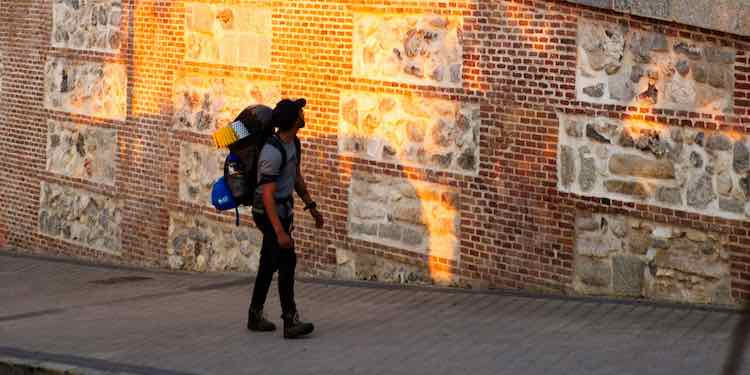We can think of life as a journey. When I was a young Christian, just out of my teens, I thought I kind of knew what my life journey would look like.
I felt I had a reasonable grasp of Christian doctrine. I thought I understood why I believed what I did. What could possibly go wrong?
But my faith has taken many unexpected turns. My journey has ended up in a quite different place than I expected. And I’ve learned a few lessons along the way.
A “normal” start
I made the choice to believe in Jesus in a mildly reformed and evangelical (in the British, not US sense) church, where pretty much all I needed to do was ask Jesus to save me. Then believe the doctrines I was being taught, and of course, start to tell other people they should believe too.
Probably the same starting place as millions of other Christians.
But it wasn’t long before I faced a fundamental question.
What was Jesus on about, really?
This was once the clearest truth of all. Jesus came to give his life as a ransom for many. It’s all laid out in Romans – human sin, death, Jesus’ death, believing – salvation by grace through faith.
Trouble was, Jesus didn’t teach it like that. He was on about the dawning age of the kingdom of God which he was bringing. He said we had to enter this kingdom like a child. And we’d be judged by how we treated others, as if they were him. He didn’tconform to what I was being told was true Christian faith. It just didn’t add up.
The church was supposed to be following Jesus’ teachings, but Christians seemed to ignore or explain away some of his hardest sayings, on the perils of wealth, on forgiveness and loving enemies, on sharing with the poor and disadvantaged and on religious hypocrisy.
Two years of compulsory army service reinforced all this to me. In that time I came to believe that Jesus meant what he said in the sermon on the mount – radical, I know! 🙂 And in particular he meant what he said about non-violence.
Some Christians completely change their beliefs at this point. They follow Jesus and turn away from Paul and traditional Christianity. But I couldn’t do that. I felt we can’t really turn away from either or change what they said. If we leave either behind, we’ve thrown away half of our heritage.
Somehow, there is a deeper truth that fits both these perspectives. I feel like I’m getting some ideas on that but I’m not there yet.

But whatever I do, I think I’ll always see Paul’s teachings on salvation within the bigger picture of the kingdom of God and his justice and the renewal of all creation.
I had taken a fork in the road while most of my friends continued straight on.
The Bible – perfect or deeply flawed?
As I continued my journey, I started to notice other anomalies, especially in the Bible. For example ….
- Did God really command Joshua to genocide?
- Could all the difficulties (such as how Judas died or how many angels were present at Jesus’ tomb) really be explained satisfactorily?
- Were the creation and flood stories in Genesis really true, and biological, geological and genetic science actually false?
- Why did the New Testament writers sometimes get the Old Testament quotes wrong or out of context?
I began to read alternative views, from secular scholars, atheist critics and liberal Christians. Was the Old Testament just a bunch of folk tales by stone age goat herders? Did Jesus’ followers really make up the story that he was resurrected?
As I stumbled down that rocky road, I started to find answers, though sometimes it took decades to get there.
Yes, the Old Testament really was partly historic and partly folk tale, legend or exaggerated. But that didn’t mean the New Testament was the same.
No, when examined closely, the gospels are good history, just not perfect history by our standards. Jesus really did live, teach, earn a reputation as a healer, and die a painful death. His disiples really did believe he had been resurrected, and they believed this right from the beginning. Even secular historians said so.

So again I came to an intersection with three roads to choose from.
Many of my friends chose to believe that all the anomalies could be explained, God really did command genocide (thought they wouldn’t use that word!) and the Bible was without any significant error.
Others I knew gave it all up. If the Bible wasn’t perfect, it couldn’t be trusted, and faith died.
But there was a middle road. Like everything else in life, we don’t have certainty, but rather likelihood. We get along OK with a measure of uncertainty. And so I felt confident that the Jesus of the gospels was true even if some of the things written about him are uncertain. The Old Testament is much more problematic, but that doesn’t change the reality of the Jesus of history.
The Bible is a document of its times, reflecting what people believed and experienced. We can see in it how God led the Jews, and much of the world, out of pagan idolatry and into monotheism. He inspired the authors in subtle ways and uses their writings to show us the way, if we have ears to hear.
I walked on in my journey, but there were fewer on the same road with me now.
Which gospel?
On this part of my journey I had a large road on either side of me while I walked down a bush track.
On the road to my right everyone knew exactly what the gospel was. Sin, Jesus, salvation, heaven or hell, in or out. Nothing else mattered, not justice, not care for the marginalised. Well, they did sort of matter, but not in comparison with the true gospel. Best not get diverted from that.
I had walked that road for years.
Leaving this road was pretty easy in the end. I’d already noted that Jesus opened up a far larger picture than personal salvation. An impeccably evangelical professor of Greek showed me that Jesus didn’t teach everlasting torture in hell. CS Lewis used the Narnia character Emeth to teach me that God’s acceptance could be wider than I had been taught. Romans 2 showed a way for non-believers to receive God’s grace. I walked away.
On the road to my left, people thought that gospel message was divisive and exclusive. Jesus was all about caring for the poor, standing up for the disadvantaged, turning the pecking order upside down. This road looked attractive and inclusive. What’s not to like? “Gospel” means “good news”, and this certainly seemed like good news.
But wishful thinking isn’t enough. Jesus did say we’d be judged by our actions towards suffering people. But he also spoke about two ways that can lead to either life or destruction. He said he came to give his life to ransom many people. He called on people to believe in him. He said the first commandment was to love God, and the second to love neighbour. He promised his Spirit to guide us and empower us.
Life in the kingdom isn’t just about good deeds, but also about repentance, faith, relationship with God and walking in the Spirit.

And so I found myself in a less used track between these two roads. Sometimes walking close to the “salvation” road, and sometimes closer to the “good deeds” road.
Both roads are important, and I wanted to see them join up. But until they do, I walk this bush path with just a few companions.
Does God love everyone?
I came to another junction. When I was walking the conservative road, there were certain behaviours that weren’t acceptable. It varied depending on who you were walking with. It definitely included gays, sexually active singles, drunkards and criminals. In some groups, it included other behaviours too.
Curiously, it wasn’t so common that unacceptable behaviours included the wealthy, or men who were violent towards their wives, or people who showed no compassion for others. The church oftern seemed to overlook, maybe even protect, such people.
The Bible seemed to give a different set of unacceptable behaviours than those promoted by the church. It just didn’t seem right.
It was easy to take a left hand fork in the road at this point. But again, I couldn’t quite join the other road, where a different set of behaviours were unacceptable and acceptable. The main values seemed to be lack of tolerance and fighting systemic evil, like racism, genocide and violence.

I agreed with the broader understanding of ethics and justice, but I felt some of the old fashioned “seven deadly sins”, like anger, jealousy, sloth, gluttony and lust, were being set aside. I couldn’t help feeling that God would want us to focus on both personal and corporate sin and justice. To focus on knowing him through prayer and the Holy Spirit.
I was definitely closer to the left hand road, but not all the way there.
Giving up on the church
What’s a pilgrim to do about the church? Those on one road seem to think all is well, it is just the world that is out of step. Carry on regardless.
But I observed a path leading away from the left hand road where people just gave up on the church. Maybe they were traumatised by how the church had treated them. Maybe they couldn’t believe in some of the doctrines any longer. Maybe they simply had better things to do.
I must admit I was tempted. Sometimes I find myself walking with them. After all, if the church isn’t cutting it, isn’t fulfilling it’s mission, why not walk away?
But walking away doesn’t always help with fulfilling the mission Jesus gave us. Going it alone can be lonely. The spark can go out, just as a red hot ember will quickly cool if removed from the fire.
I remembered a Bob Dylan aphorism: “To live outside the law you must be honest”. Leaving the discipline of the church requires greater self discipline and commitment. It isn’t easy to keep that up all the time.

So again I find myself on a different path, neither committed to the church nor walking away from it. Rather, I’m looking for a path that leads to a new way of doing church. And I’m finding many people beating a new path through the postmodern bush, trying different things that might be the church in our day. Like me not willing to walk the easier roads of acceptance or dismissal of a moribund church.
Same as it ever was?
And so my pilgrimage continues. Trying to hold on to what was valuable and true of both the old conservative way and the newer progressive way. Trying to follow Jesus in loving God and loving neighbour.
Allowing and even inviting God to point out where I fall short, how I can know him better. How I can see Jesus more clearly, love him more dearly and follow him more nearly. And in so doing, be better equipped to serve the poor and marginalised, stand against injustice and not participate in unust systems.
It’s a lonely road sometimes, but I meet some wonderfully interesting and imaginative fellow pilgrims.
Why don’t you join us?
Photo: by Gonzalo Carlos Novillo Lapeyra.





Your Journey mirrors mine in many ways. I really appreciate your diverging roads analogy. I just shared this with a friend as it serves as a tool to easily and articulately share my similar faith journey with others.
My big divergence was from the fundamentalist need for certainty and an authoritarian Father God with strict rules; focusing on a future reward for obedience and punishment for sin to a much softer faith focused on love of neighbor and the marginalized where Jesus is emphasized as compassionate rather than an enforcer and more in the here and now. This need to soften the fundamentalist message that I was hearing from the pulpit and to harmonize that softness with the Bible has been an awesome journey.
Thanks
Dean
Thanks Dean. I guess we are “fellow pilgrims”.